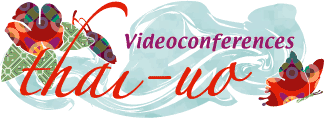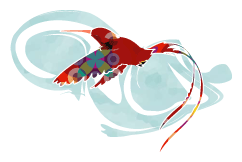Archived Series – Reflective Teaching
 |
||
 |
Documents |
2004-05 Archived Handouts and ResourcesHandout: Reflective Teaching Slides: Reflective Teaching |
Videos |
2004-05 Archived Lecture PresentationOnline access to the videoconference lecture requires a broadband (DSL, cable, ethernet, etc.) Internet connection. The lecture is available in RealPlayer formats for both Windows and Macintosh computers: Video Session, RealPlayer Format Video Session, Windows Media Player Format |
2004-05 Archived Series – September 30, 2005
Reflective Teaching Practices
Iris Moye and Leslie Opp-Beckman, Speakers
September 30, 2005
Overview
This is the tenth lecture in a 10-part professional development series for English as a Foreign Language educators in Thailand. University of Oregon is partnering with the US Embassy in Bangkok, the Royal Thai Distance Learning Foundation, colleagues at Chulalongkorn University, and at ThaiTESOL on this innovative and exciting project.
Announcement
Be sure to revisit this site for a second series, beginning November 2005.
About the Speakers
Iris Esau Moye is a Senior Instructor at the University of Oregon. She teaches in the Linguistics Department and the American English Institute. She also supervises student teachers in the College of Education.
Leslie Opp-Beckman is on faculty at the University of Oregon in the Linguistics Department and the American English Institute. She develops e-learning curriculum and and teaches courses on Computer-Assisted Language Learning.
Discussion Questions
- What kinds of reflective practices do you already use as part of your daily teaching?
- Which, if any, of the methods described in the readings below might be useful to your reflective processes (e.g. diary, journal, mentoring, portfolio, setting goals or benchmarks, etc.). Explain.
Online Resources
Pedagogical Readings
Following are some readings with an overview of reflective teaching practices and how they apply to English language classes. The first two readings in the list will give you a good basis for further understanding of this topic.
- Reflective Teaching: Exploring Our Own Classroom Practice, by Julie Tice. Reflective teaching means looking at what you do in the classroom, thinking about why you do it, and thinking about if it works. It’s a process of self-observation and self-evaluation. By collecting information about what goes on in our classroom, and by analysing and evaluating this information, we identify and explore our own practices and underlying beliefs. This may then lead to changes and improvements in our teaching.
- Reflective Practice and Professional Development,
(ERIC Digest ED449120), by Joan M. Ferraro. - Think, Writing a Teaching Diary.
From BBC/British Council. (2004). - Teacher Mentoring as Professional Development,
(ERIC Digest ED460125), by Leslie Huling and Virginia Resta.
Practical Resources
Following are some resources that support content-based instruction and provide practical ideas for the classroom.
- Mentoring Teachers: A Handbook for Reflective Teaching
Adapted from Reflective Teaching: An Introduction by Kenneth Zeichner and Daniel P. Liston. (1996). This handbook summary asks teachers to “think about what we wish to accomplish in the classroom, why we have chosen these goals, and how we wish to achieve these goals.” Learn how to set benchmarks before teaching, study methods of observation, and practice keeping a journal. - Developing an Academic Portfolio: Guidelines
From UT Sydney, Australia. (2004). Information on Academic Portfolios, organized records of teachers’ academic experiences, achievements and professional development over a period of time. It consists of a collection of documents which illustrate the variety and quality of work, along with reflections on these documents and on the teachers’ development over time. - Portfolio guides and checklists for teacher development, from S. Klinghammer, University of Oregon [MS Word files]: Portfolio Process, Portfolio Contents Guide, Portfolio Conference Guide, Peer Evaluation, Self-Evaluation, Final Evaluation.